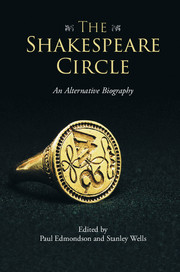Book contents
- Frontmatter
- Contents
- List of illustrations
- List of contributors
- Preface and acknowledgements
- General introduction
- Part I Family
- 1 His Mother Mary Shakespeare
- 2 His father John Shakespeare
- 3 His siblings
- 4 His sister's family: the Harts
- 5 His wife Anne Shakespeare and the Hathaways
- 6 His daughter Susanna Hall
- 7 His son-in-law John Hall
- 8 His son Hamnet Shakespeare
- 9 His daughter Judith and the Quineys
- 10 His granddaughter Lady Elizabeth Barnard
- 11 His ‘cousin’: Thomas Greene
- Part II Friends and Neighbours
- Part III Colleagues and Patrons
- Closing remarks
- Afterword
- Index
- References
7 - His son-in-law John Hall
from Part I - Family
Published online by Cambridge University Press: 05 November 2015
- Frontmatter
- Contents
- List of illustrations
- List of contributors
- Preface and acknowledgements
- General introduction
- Part I Family
- 1 His Mother Mary Shakespeare
- 2 His father John Shakespeare
- 3 His siblings
- 4 His sister's family: the Harts
- 5 His wife Anne Shakespeare and the Hathaways
- 6 His daughter Susanna Hall
- 7 His son-in-law John Hall
- 8 His son Hamnet Shakespeare
- 9 His daughter Judith and the Quineys
- 10 His granddaughter Lady Elizabeth Barnard
- 11 His ‘cousin’: Thomas Greene
- Part II Friends and Neighbours
- Part III Colleagues and Patrons
- Closing remarks
- Afterword
- Index
- References
Summary
John Hall, William Shakespeare's son-in-law, is seldom considered in his own right, and when he is the results are often contradictory. He may have been a highly qualified physician, or an unqualified empiric; a radical Paracelsian, or a conservative Galenist in education and practice, or ahead of his time; a Puritan with no sympathy for the theatre, or a good friend as well as son-in-law to Shakespeare. I shall try to integrate these differing views, without attempting documentary exhaustiveness.
His father was William Hall of Carlton, Bedfordshire; his mother is unknown. There are no baptismal records in Carlton for 1575, when John was born (Gray 1936, p. 344). John studied at Queens' College, Cambridge, receiving his BA in 1593/4 and MA in 1597. We have no other records of his life before he moved to Stratford-upon-Avon in 1607, but he must have gained sufficient experience in that time to be able to set up his own practice.
He never obtained, or claimed to have, the degree of Doctor of Medicine. His qualifications in fact put him in the mainstream of physicians at his time. Of 814 physicians practising outside London between 1603 and 1643, 78 per cent had formally matriculated (enrolled) at a university (Raach 1962, p. 250). Forty per cent held BAs, 34 per cent MAs and 30 per cent MDs. An MD was required for licensing by the College of Physicians of London or to teach at a university, but not otherwise. An academic doctorate was no more necessary as a medical qualification then than it is now. Hall never used the title of Doctor, nor was he addressed so by his contemporaries, though he has frequently and confusingly been granted it post mortem. He may, like many English students, have travelled around the Continent and studied for a few weeks or months at one or more universities. If such short-term unregistered students paid their bills and stayed out of trouble, they commonly left no record behind them.
- Type
- Chapter
- Information
- The Shakespeare CircleAn Alternative Biography, pp. 86 - 100Publisher: Cambridge University PressPrint publication year: 2015

